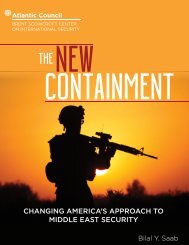POLITICS GOVERNANCE STATE-SOCIETY RELATIONS
Politics_Governance_and_State-Society_Relations_web_1121
Politics_Governance_and_State-Society_Relations_web_1121
You also want an ePaper? Increase the reach of your titles
YUMPU automatically turns print PDFs into web optimized ePapers that Google loves.
<strong>POLITICS</strong>, <strong>GOVERNANCE</strong>, AND <strong>STATE</strong>-<strong>SOCIETY</strong> <strong>RELATIONS</strong><br />
they see around them in the region. Fear drives<br />
a readiness to trade off many other things—civil<br />
liberties, individual choice, economic liberty, etc.—<br />
for security, order, and predictability of basic<br />
justice. These constituencies’ convictions may be<br />
hard to shake even when perceived security threats<br />
become less urgent. In the current environment of<br />
uncertainty and violence, even a state’s failures at<br />
using coercion against extremist forces may simply<br />
generate arguments for more coercion, producing a<br />
vicious spiral away from the requisites of sustainable<br />
governance. For their part, external powers with<br />
a stake in the stability of the Middle East may<br />
prioritize state-imposed “order” even more highly<br />
than regional publics, since external actors do not<br />
directly bear the costs of this authoritarian bargain.<br />
The erosion of political and social authority<br />
and the breakdown of social trust also strongly<br />
suggest that the time for top-down solutions in<br />
the Middle East is over. Dictates from existing<br />
power centers are unlikely to win the allegiance<br />
of skeptical citizens. Citizens already mistrustful<br />
of government are unlikely to give their allegiance<br />
to a centralized bureaucracy in a far-off capital.<br />
And citizens emerging from sectarian warfare who<br />
barely trust their next-door neighbors will only<br />
trust an authority that places their own sectarian<br />
identity above others (and will therefore continue<br />
the violence), or one that involves compromises<br />
that they themselves construct and buy into.<br />
Thus, in both post-conflict and surviving Arab<br />
states, durable solutions to pressing problems of<br />
governance and society will have to emerge from<br />
bottom-up dialogue and the patient construction<br />
of societal consensus. This may be especially<br />
important for societies emerging from violent civil<br />
conflict, where, as an initial matter, citizens must<br />
be persuaded that the state is something that<br />
can deliver and is worth investing in with their<br />
participation and loyalty. But across the region,<br />
rebuilding social trust is a key challenge that<br />
must be met to construct a sustainable basis for<br />
governance in the Middle East in years to come.<br />
+<br />
BOX 1: SECTARIANISM AND CONFLICT IN TODAY’S MIDDLE EAST<br />
In today’s Middle East, sectarian tensions and violence present a challenge to basic order, to states that<br />
comprise multiple religious and ethnic communities, and to citizens’ sense of justice and fairness. But<br />
“ancient tribal hatreds” are not a given in the Middle East, nor is sectarian violence simply a “natural”<br />
outgrowth of state breakdown. As was true in other multiethnic societies, such as Yugoslavia in the<br />
1980s, religious differences in places like Baghdad over many years did not prevent peaceful coexistence,<br />
cooperation, or even high rates of intermarriage. Nevertheless, sectarian differences were exploited by<br />
political leaders in Iraq and elsewhere to advance their own agendas. The same holds true today.<br />
The sectarian violence we see in Iraq and the Levant today is also an outgrowth of the American invasion<br />
to topple Saddam Hussein. The removal of a minority Sunni leader who had massacred Shia, and his<br />
replacement by a Shia-led government, provoked fear and anxieties on both sides of that sectarian<br />
divide. The American occupation, and the American withdrawal, each in turn facilitated conditions for<br />
a sectarian bloodbath, and lent both space and motivation to extremist Islamists who built a terrifyingly<br />
dark vision of their desired future and set about to realize it. That said, the invasion and occupation of<br />
Iraq did not destabilize the existing state system in the Middle East and create the Arab Spring, or the<br />
chaos and violence we see in Syria, Libya, and Yemen today. It did not create jihadist violence, although<br />
it certainly gave it new forms. The Iraq war also did not even create sectarian violence in Iraq, although<br />
it made that violence possible on a horrific scale. More broadly, in Iraq and beyond, Sunni-Shia divisions<br />
in today’s Middle East overlay a wider division of interests and preferences between traditional Arab<br />
states, led by Saudi Arabia, and a coalition of state and non-state actors, led by Iran. Sectarian divisions<br />
in the Middle East have thus become a convenient proxy for, and are driven in part by, a more traditional<br />
power struggle.<br />
In confronting the Arab uprisings, governments on both sides of the Sunni-Shia divide found a sectarian<br />
narrative useful in rallying their populations and in justifying their actions. For its part, Iran sought first<br />
to claim credit for the revolutions in Tunisia and Egypt based on its own revolutionary ideology. When<br />
rebuffed, it concentrated on winning Shia loyalties among the aggrieved protestors in Bahrain and ►<br />
ATLANTIC COUNCIL<br />
19



